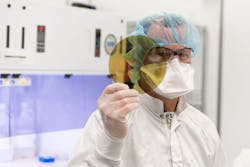EV Supply Chain Expands with Michigan's New Semiconductor Wafer Plant
Michigan’s march to be a leader in advanced mobility and electrification continues with the announcement on August 24 that semiconductor wafer manufacturer SK Siltron CCS is establishing a new facility in MonitorTownship to support electric vehicle growth. The company will invest $302 million creating up to 150 jobs.
The company, a subsidiary of SK Siltron, an operating company of South Korea’s SK Group, has its U.S. headquarters in Auburn, Mich. It manufactures a specialty wafer made of silicon carbide (SiC) that can be used in the semiconductor power components of electric vehicles. The company said, in a statement, that its wafers are more efficient at handling high powers and conducting heat than normal silicon. The result of this efficiency is that when used in EV system components, the transfer of electricity from the battery to the motor results in an increased driving range of an EVY by 5%-10%.
“The growth of electric vehicles is opening an exciting new chapter for the auto industry as it provides consumers with more environmentally friendly transportation options,” said Jianwei Dong, CEO for SK Siltron CSS, in a statement. “SK Siltron CSS is proud to partner with the State of Michigan to build the supply chain and create the skilled jobs required to support the next generation of EVs, ensuring Michigan remains the automotive center of the world.”
Ensuring that Michigan continues its place in automotive history, last year it released a report from the Council on Future Mobility and Electrifications. “This report also provides an analysis of the future challenges that Michigan must begin to address to remain a global mobility leader,” said Susan R. Corbin Acting Director, Michigan Department of Labor & Economic Opportunity. In her opening letter, she outlines the economics of this market.
By 2030, hybrid or electrified vehicles will represent 51% of all vehicle sales, 50% of vehicle production will have Level 2 autonomy or higher, and software will represent more than 50% of the value of a new vehicle. Beyond technology, the mobility industry demand for computer-related engineers will eclipse 45,000 nationally by 2030, and the demand for new jobs in the utility sector deploying charging infrastructure will reach 105,000. Additionally, the automated vehicle market will grow over $3.3 trillion in value.
Making her case as to why Michigan can secure leadership in this sector, she points out that over the past 10 years, the manufacturing sector has grown in Michigan. Additionally, the state has attracted the “nation’s largest concentration of engineering talent.”
Part of that growth can be attributed to SK Siltron, which had doubled its employee base in Michigan since acquiring the business in 2019. It currently employs 130 skilled workers and professional engineers.
For this new plant the company, working with both state and local agencies to recruit and train employees, will hire both skilled workers (70% of total workers, and professional workers (30%).
Training, as well as R&D in the semiconductor market, has been supported by Hemlock Semiconductor, KLA, as well as the University of Michigan.
The state has also invested in the EVs supply chain as recently as July, through the Michigan Strategic Fund which provided assistance for Ford’s new global battery center of excellence in Romulus.
The federal government sees the new plant as a way to achieve a variety of national goals. "As we build toward a more sustainable future, it is important that we create new, robust supply chains in the U.S. to support our corporations and the end consumer. The automotive industry has a tremendous opportunity with the rise of the electric vehicle, and we're excited to see companies like SK Siltron CSS expanding to help support the transition to a green future," said U.S. Secretary of Commerce Gina M. Raimondo, said in a statement.
About the Author
Adrienne Selko
Sr. Editor
Focus: Workforce, Talent
Email: [email protected]
Follow Me on Twitter: @ASelkoIW
Senior Editor Adrienne Selko has written about many topics over the 17 years she has been with the publication and currently focuses on workforce development strategies. She is also a senior editor at Material Handling & Logistics and EHS Today.
Previously Adrienne was in corporate communications at a medical manufacturing company as well as a large regional bank.
She is the author of Do I Have to Wear Garlic Around My Neck?, which made the Cleveland Plain Dealer's best sellers list.
